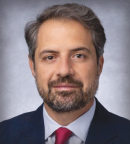The novel anti-CD19 autologous chimeric antigen receptor (CAR) T-cell therapy obecabtagene autoleucel achieved durable remissions in 40% of patients with relapsed or refractory B-cell acute lymphoblastic leukemia (ALL) without a subsequent stem cell transplant, according to results from the phase Ib/II FELIX trial presented at the 2024 ASCO Annual Meeting by Elias Jabbour, MD, and colleagues (Abstract 6504).

Elias Jabbour, MD
The open-label, multicenter, single-arm trial treated 127 adult patients with relapsed or refractory B-cell ALL with obecabtagene autoleucel. Trial participants were given lymphodepletion followed by obecabtagene autoleucel infusion in split doses on days 1 and 10.
At a median follow-up of 21.5 months, these patients were in ongoing remission without stem cell transplant or other therapies. The 12-month event-free survival and overall survival rates were 49.5% and 61%, respectively.
Eighteen percent of patients, all with no measurable residual disease, went on to receive a stem cell transplant after obecabtagene autoleucel infusion. Of these patients, 55% had persistent CAR T cells present prior to transplant. The median time to stem cell transplant was 101 days after treatment.
The median event-free survival and 12-month event-free survival rate were identical between those who did and did not receive a stem cell transplant, and similar findings were observed when researchers assessed for overall survival.
Side effects were consistent with previous studies, and no new adverse effects were identified.
These results suggest that stem cell transplants did not offer additional value for these patients and that obecabtagene autoleucel could be considered as a standalone treatment, Dr. Jabbour explained.
“We observed that persistence of CAR T cells and B-cell aplasia both were associated with improved event-free survival in patients treated with obecabtagene autoleucel,” said Dr. Jabbour, Professor of Leukemia at The University of Texas MD Anderson Cancer Center. “These outcomes demonstrate a potential of a long-term plateau in the survival curve, which supports this therapy being considered as a standard-of-care for adults with relapsed or refractory B-cell ALL who currently have limited treatment options.”
Disclosure: The study was funded by Autolus Therapeutics. For full disclosures of the study authors, visit coi.asco.org.

